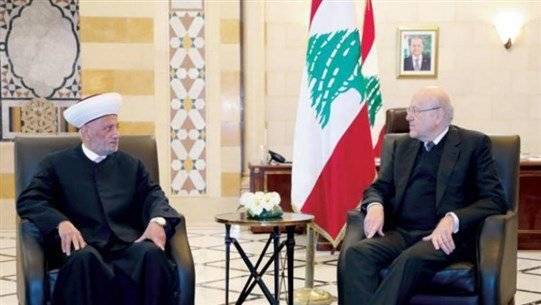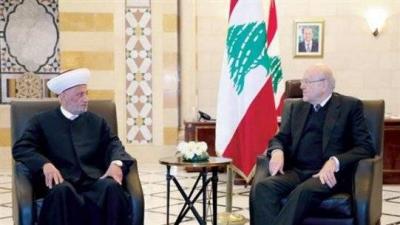The Sunni component is almost absent from the strained political scene in Lebanon, were it not for President Najib Mikati's dual role as the caretaker Prime Minister and his mandate to form a new government, an endeavor that seems far-fetched with the constitutional deadline for electing a new President approaching on September 1. This deadline comes before the term of President Michel Aoun ends on October 31, should international pressures facilitate the presidential elections on time to prevent the country from entering a presidential vacuum. The absence of the Sunni component from the political landscape for the first time since Lebanon's independence stems from its lack of effectiveness in Parliament. The mere occupancy of seats designated for the Sunni community does not imply that the majority of Sunni deputies managed to fill the void left by the withdrawal of former Prime Ministers from running for parliamentary elections, particularly following the decision of former Prime Minister Saad Hariri to suspend his political activity. The parliamentary elections resulted in 19 new deputies from a total of 27 Sunni deputies in the legislative council. The withdrawal of Prime Ministers from candidacy led to a 6% decrease in Sunni voter turnout compared to the previous elections and consequently a rise in void ballots, which topped the list compared to other sects' void ballots, alongside the absence of an effective parliamentary bloc.
Even though the "resistance" axis led by Hezbollah and its allies did not benefit, as expected, from the withdrawal of Prime Ministers from the elections, the Sunni presence in Parliament lacks a parliamentary personality capable of uniting the deputies who are scattered across different factions, except for the Northern Moderation bloc, which comprises four Sunni deputies, matching the number of seats held by the reformist forces. Although the Northern Moderation bloc is within the orbit of political Hariri, it suffers from a lack of communication with the Future Movement leader, Saad Hariri, who only communicates sporadically with Mikati. Meanwhile, his relationship with former Prime Minister Fouad Siniora is undergoing a silent crisis that is difficult to overcome, having reached a deadlock. However, Hariri's political presence intermittently appears in the political arena chiefly to record objections against Aoun and his political team, sometimes expressing opinions on pressing issues without absolving Hezbollah from its responsibility for leading the country towards collapse and the deterioration of Lebanon's relations with Arab countries, specifically the Gulf region. The rift between the Lebanese Forces and the Future Movement indicates further deadlock between yesterday's allies, with no apparent prospects for mending their relationship.
The absence of Hariri from the electoral battle has led to the fragmentation of the Sunni voice, making it impossible to regroup the majority of Sunni deputies under one roof, adversely reflecting on the election of Speaker Nabih Berri and his deputy Elias Bou Saab, and later in the first legislative session, where there was a noticeable absence of Sunni deputies due to their lack of initiative to affirm their active presence, not just in numbers. Hariri's absence from influence in the political equation comes at an unprecedented time coinciding with the country's preparations for the election of a new President. Although the Prime Ministers, in Hariri's absence, continue to monitor developments and adopt positions, most notably aligning with Mikati and supporting his conditions for forming a new government, their communication is primarily limited to the designated President, Siniora, and former Prime Minister Tammam Salam, who was the first to announce his decision to withdraw from the elections, making way for youth groups calling for change. Nevertheless, the ongoing daily follow-up by the Prime Ministers regarding the internal situation remains below the required level unless it transforms into a formidable force capable of rallying the largest number of Sunni deputies into a parliamentary bloc that can exert its influence in electing a new President, so that other political forces do not race to gain support from some for this or that candidate.
Furthermore, the scattering of Sunni deputies weakens their community's standing in the political equation, which is viewed with great caution, especially if some treat their new situation as the weakest link in the presidential elections compared to the roles played by other major sects, benefiting from the Prime Ministers’ decision to clear the ground during the parliamentary elections. The question remains: Are the circumstances conducive to reorganizing the Sunni house? And who are the personalities capable of playing a unifying role, especially since Hariri distances himself from involvement and does not communicate with deputies aligned with political Hariri? The question also applies to the ability of some Prime Ministers to coordinate with Mufti Sheikh Abdul Latif Deryan to bring unity back, especially since the majority of Sunni deputies, even if they do not agree on the most prominent political issues, with the challenge being that some attempt to present themselves as the political alternative and heir to Hariri’s legacy following his decision to suspend his political activity. In this context, it is rumored that Mufti Deryan is moving to unite the Sunni component to fill whatever voids exist, receiving support from the majority of deputies, but the key to success lies in translating intentions into actions before it is too late as the countdown to electing a new President begins.




